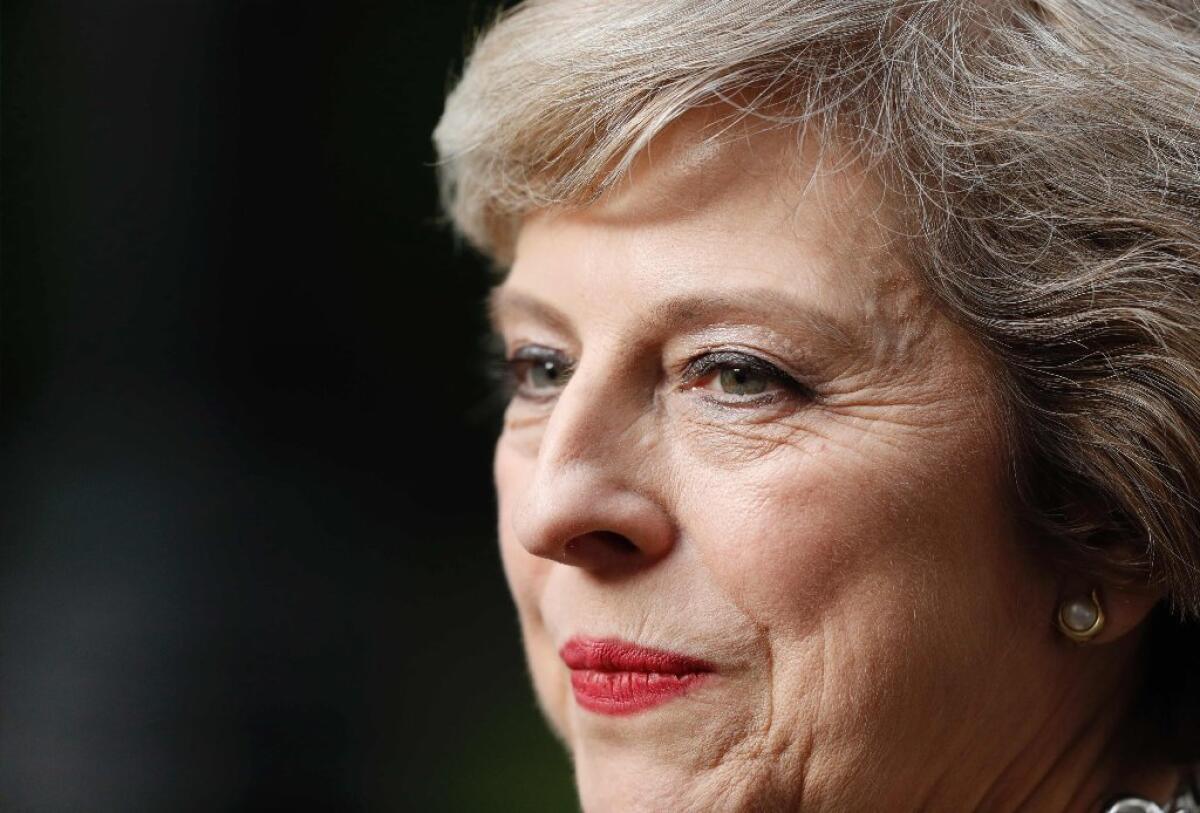Column: Britain’s diabetic leader reflects differing healthcare systems

- Share via
Britain has a new prime minister – Theresa May – and much of the coverage this week has focused on her being only the second woman in the country’s history to run the government.
An equally intriguing factoid is that, as far as anyone knows, May, 59, is the first contemporary world leader with Type 1 diabetes.
This provides an opportunity to look at how Britain’s universal-coverage health insurance system compares with the largely for-profit, market-oriented American approach.
The two key yardsticks in treating diabetes effectively are access to care and cost of drugs. In both cases, the Brits have it better.
“When you have a chronic condition, it’s just a fact that there will be regular charges to maintain your health,” said Shana Alex Charles, an assistant professor of health sciences at Cal State Fullerton.
“In this country, you might have to worry about being able to afford all the necessary supplies,” she said. “In Britain, that’s not a worry. It’s not a question that you’ll be able to get what you need.”
It’s simplistic to suggest that Britain and other nations with single-payer insurance systems do everything right, whereas the United States does everything wrong. For those who can afford it, U.S. healthcare is second to none.
Britain’s National Health Service, meanwhile, provides mostly free-of-charge, taxpayer-funded healthcare to all but, according to the British think tank King’s Fund, is grappling with money troubles, long wait times and hospital overcrowding.
Even so, a 2006 study in the Journal of the Royal Society of Medicine comparing diabetes management in Britain and the United States found that while the populations of the two countries were similar in many ways, a key difference was the large number of Americans who lacked adequate health insurance.
“Access to health coverage is a key determinant of quality of care for a chronic condition such as diabetes,” the study concluded. “For chronic diseases such as diabetes that can be largely managed without inpatient care, a system like the NHS that provides universal coverage free at the point of use may be substantially more cost-effective than the more mixed system found in the USA.”
The vast majority of people with diabetes worldwide have Type 2, which is frequently associated with obesity and can be treated in a variety of ways. Type 1 is an autoimmune disorder requiring multiple daily insulin injections.
Obamacare has helped provide coverage to people with diabetes. No longer are people with “pre-existing conditions” shown the door by profit-conscious health insurers. But medical costs, particularly for those with high-deductible health plans, can be burdensome.
A Reuters analysis of drug prices last year found that Americans with diabetes can pay as much as seven and a half times more for insulin than people in Britain. A recent report in the Journal of the American Medical Assn. found that U.S. insulin costs more than tripled between 2002 and 2013. Average annual spending on insulin per U.S. patient jumped to $736.09 from $231.48.
The drug industry says actual costs are lower once rebates and other discounts are taken into account.
“The U.S. system gives the best possible care for those who are insured or covered or can otherwise afford it, but those who are uninsured or are failing to get good access are sometimes quite poorly diagnosed and treated for chronic diseases,” said Alastair Gray, a health economist at the University of Oxford.
“The U.K. system puts less emphasis on providing the best for some and instead provides a more comprehensive coverage,” he said. “For the whole population it gives results that are equal to or slightly better than the U.S. performance and at much lower cost.”
Britain spends about 10% of its gross domestic product on healthcare, according to the Organization of Economic Cooperation and Development. The United States spends 17%.
Carol Propper, a health economist at Imperial College London, said that even with lower healthcare spending as a percentage of GDP, Britain has managed to make healthcare more accessible to the general population. “In the U.S.,” she said, “the allocation is probably more unequal,” favoring those with financial means.
Like May, I have Type 1 diabetes and can speak firsthand to the challenges of dealing day to day with a disease that afflicts nearly 10% of the U.S. population and is the country’s seventh leading cause of death.
About 6% of Britain’s population has diabetes, but the disease isn’t among the country’s top 10 killers. That speaks to significantly more effective efforts at managing the illness.
I wrote on Tuesday about how healthier Americans are gravitating toward high-deductible insurance plans with lower monthly premiums, resulting in higher insurance costs for people who desire, or require, more comprehensive coverage. A Medicare-for-all system similar to Britain’s would address that.
It would also go a long way toward not just addressing the needs of people with chronic conditions but society as a whole. The U.S. economic cost of diabetes – treatment and lost productivity – is estimated by the American Diabetes Assn. to run at least $245 billion a year. Heart disease, cancer, stroke, Alzheimer’s – hundreds of billions more. Healthcare spending will account for a fifth of our economy by 2025, according to a recent study.
The British healthcare system isn’t perfect. But, more so than our own, it acknowledges that sickness touches us all, one way or another.
And dealing with that is everyone’s responsibility, from the head of government on down.
David Lazarus’ column runs Tuesdays and Fridays. He also can be seen daily on KTLA-TV Channel 5 and followed on Twitter @Davidlaz. Send your tips or feedback to david.lazarus@latimes.com.
MORE FROM DAVID LAZARUS
Cutting healthcare costs shouldn’t be this painful
Now on Starbucks’ menu: Less health coverage
Big companies pad their bank accounts instead of passing the savings to consumers







